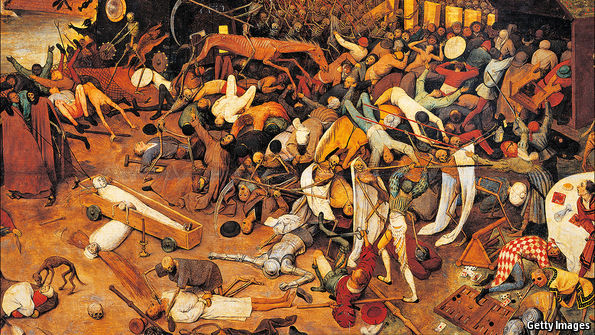Apocalypse then: The lessons of violence and inequality through the ages
Apocalypse then
The lessons of violence and inequality through the ages
from The Economist
I picked up this article from the book review section of The Economist.
The book’s title is “The Great Leveler”
written by Walter Scheidel.
The main theme of this book is inequality.
In “The Great Leveler”, the author oddly welcomes the Great Depression because:
1) real wages risen; 実質賃金 < => nominal wages 名目賃金
2) the incomes of the affluent fallen
Great Depression 1929~
Great Recession 2007-08
Real wages are
– wages adjusted for inflation
– wages in terms of the amount of goods and services that can be bought.
This term is used in contrast to nominal wages or unadjusted wages.
a nominal wage is not adjusted for inflation.
If you’re paid $15.00 per hour, your nominal wage is $15.00 per hour
The author puts the discussion of increased inequality in works of Piketty, Atkinson & Milanovicinto a broad historical context
Thomas Piketty
Capital in the Twenty-First Century
It focuses on wealth and income inequality in Europe and the United States since the 18th century.
The book’s central thesis is that when the rate of return on capital (r) is greater than the rate of economic growth (g) over the long term, the result is concentration of wealth, and this unequal distribution of wealth causes social and economic instability.
r > g
Piketty proposes a global system of progressive wealth taxes to help reduce inequality and avoid the vast majority of wealth coming under the control of a tiny minority.
In The Great Leveler, the author finds that inequality is almost always high or rising because political and economic power help each other and both pass down generations
The author argues that
Large-scale levellings happens in some conditional situations.
1) epidemics;
the Black Death did when it changed the relative values of land and labour in late medieval Europe
2) the collapse of states and economic systems;
at the end of the Tang dynasty in China and the disintegration of the western Roman Empire
3) total revolution;
Russian or Chinese
4) the war of mass-mobilisation
the world wars
Violence is sometimes effective but does not lead to greater equality. Most popular unrest in history failed to equalise
Mass-mobilisation warfare was the cause of the unprecedented decrease in inequality. The deployment of national resources soaked the rich
There are some factors of Low inequality:
1) income tax (94% 1944 US);
2) property tax (77% 1941);
3) physical damage;
4) post-war inflations; decreases the value of properties of the riches
5) trade unions 労働組合
Following Max Weber, the sociologist, he thinks
democracy is a price elites pay for mass warfare
& finds it has no effect on inequality like classical Athens
democracy follows warfare
Catastrophic levellings like epidemics, revolutions & warfares will be less likely in our future anymore.
General prosperity risen.
Global inequality fallen
Attempts to ease inequality democratically through redistribution & the empowerment of labour can hardly change the trend & may prove futile (in vain, useless)
Other possibilities:
1) good, unknown transformation may come in the future, or AI may acquire its own will & change the trend
Humans need to rely on AI’s help.
We, humans, cannot help ourselves.
2) civilisational collapse might be worth paying for the Utopia.
by nuclear- or biotechnologically-mediated violence
like nuclear bombs / bioweapons
But the author doesn’t believe this possibility.
Because he concludes that, wealth may concentrate itself over time; the ability to destroy does not

